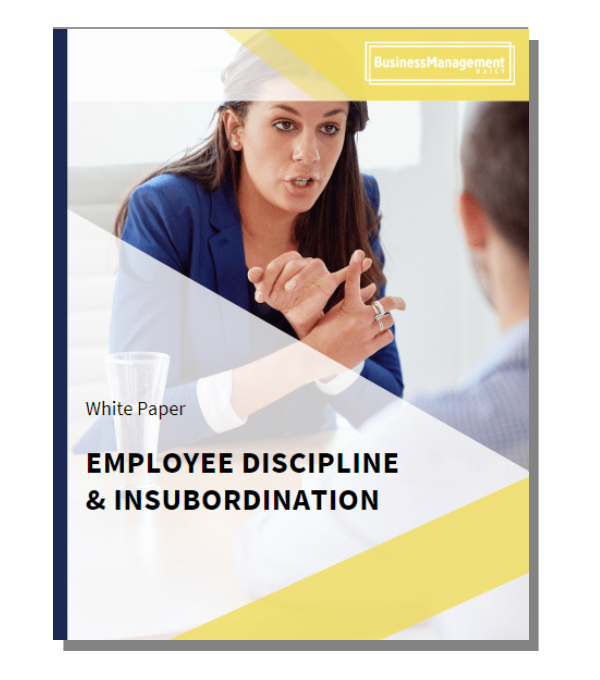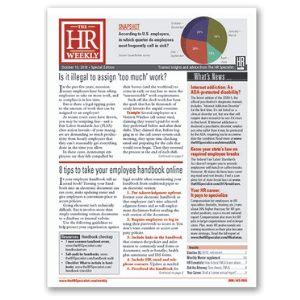July
19
- Wednesday, July 19
- 1:00 ET
- 10:00 PT
Retaliation Lawsuits: How to Build an HR System to Prevent and Protect
Retaliation prevention: Developing a checks-and-balances HR system to stop and prevent retaliation before it’s too late
In this 75-minute interactive online training, you’ll discover:

Actions you should NEVER take in response to an internal discrimination claim

How a case before the Supreme Court may set a new standard on retaliation claims — potentially making employers prove they didn’t intend to retaliate

Step-by-step documentation you need when you DO decide to discipline
Retaliation is the most common allegation in litigation … and it’s one of the easiest to prove
As a smart employer, you’ve set up an easy process for reporting discrimination or harassment and clearly explained it in the employee handbook. You’ve made sure that every complaint gets a fair and honest HR office review. When your investigation shows the employee was right, you move fast to fix the problem. The harasser is disciplined — maybe even fired but certainly moved. The discrimination is remedied — perhaps with a promotion and back pay if warranted. If the investigation finds the claims don’t amount to discrimination or harassment, you promptly explain to the employee why.
That’s it, right? You’ve done your due diligence. Maybe — but possibly not. A lot depends on what happens next — whether or not the employee’s complaint was valid. Next, you have to worry about retaliation. In fact, far more employment litigation revolves around retaliation claims than discrimination or harassment. Yes, it’s possible for an employee to lose a discrimination claim and triumph based on what happened next. Any adverse employment action that follows a complaint can be the basis for a retaliation verdict.
What is retaliation? It’s anything that would dissuade a reasonable employee from coming forward with a discrimination or harassment complaint in the first place. If a supervisor transfers the subordinate to a different shift — that may be retaliation. Or suppose a manager demotes the employee soon after the complaint. That’s potentially retaliatory, too. Firing the employee to get back at her also counts. But there are ways to protect your organization — and it’s entirely up to the HR office to do so.
Agenda for Retaliation Lawsuits
- Learn what constitutes illegal retaliation and what doesn’t
- The five steps HR has to take after a discrimination or harassment investigation
- Create a fool-proof overview process that stops a vengeful supervisor before the harm is done
- Don’t be the cat’s paw dupe — protect yourself and your organization from rogue managers punishing complainers
- Why retaliation is the most common employment law claim — even when there was no discrimination or harassment in the first place
- What workers have to show to prove they were retaliated against
- How to justify demotions, transfers and firings after dismissing a discrimination complaint
- Settling a discrimination complaint? Learn why a larger payment in exchange for quitting prevents a retaliation lawsuit

Interactive Q&A time included
Bring your specific questions or scenarios for instructor Anniken Davenport, who will provide legally sound advice on what constitutes illegal retaliation and what doesn’t.
Anniken Davenport is a noted employment law attorney and the editor of the HR Specialist: Employment Law newsletter series. She has authored several books, including Bullet-Proof Your Employee Handbook and Overtime & Other Tricky Pay Issues, published by HR Specialist. She is the co-author of the upcoming Labor & Employment Law for the 21st Century by Prentice Hall. Anniken has served as a professor at Penn State University, where she taught business law and HR management, and she directed the Legal Studies Program at Wilson College. Her legal career includes representing government units in discrimination and other employment law cases and representing school districts in labor negotiations.
Anniken Davenport Attorney and author

Professional Certification Credit Hours Included With This Webinar
Business Management Daily is recognized by SHRM to offer Professional Development Credits (PDC) for SHRM-CP® or SHRM-SCP® recertification activities.
The use of this official seal confirms that this Activity has met HR Certification Institute’s® (HRCI®) criteria for recertification credit pre-approval.
Register now and receive these free bonuses!

Employee Discipline & Insubordination
No manager wants to deal with employee behavior issues, but for most, it’s a problem that will inevitably come up. From minor infractions to major problems, handling employee discipline swiftly, decisively, and effectively is key to a healthy workplace. This white paper will help guide managers to handle employee discipline in a mature, consistent, and organized manner and earn the respect of their staff.

4 free issues of The HR Weekly
You'll also receive one month of exclusive access to The HR Weekly – our comprehensive service with all the HR advice and compliance tools to simplify your job … and to keep your organization out of court. So that you continue to benefit from The HR Weekly, we will continue your subscription after that for the then current rate, unless you tell us "no, thanks" – your choice.

We promise you'll be satisfied.
If Retaliation Lawsuits fails to meet your needs in any way, we will refund 100% of your tuition – every penny you paid – but your course materials and registration bonuses will be yours to keep. No hassles, no questions asked.

